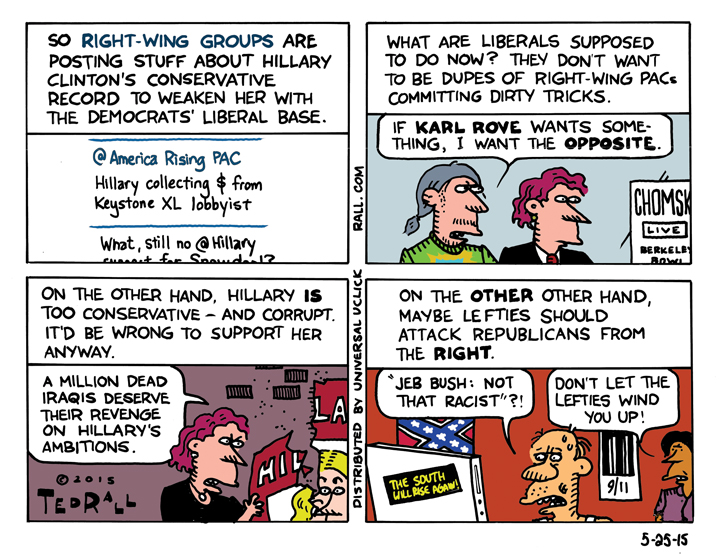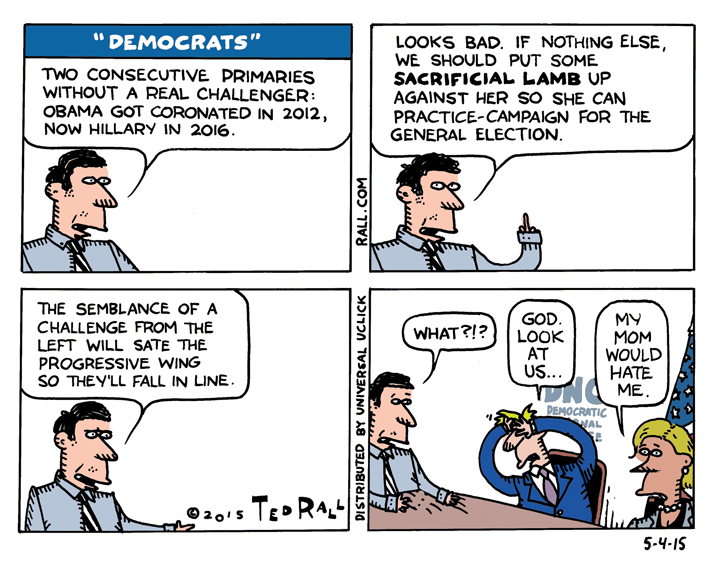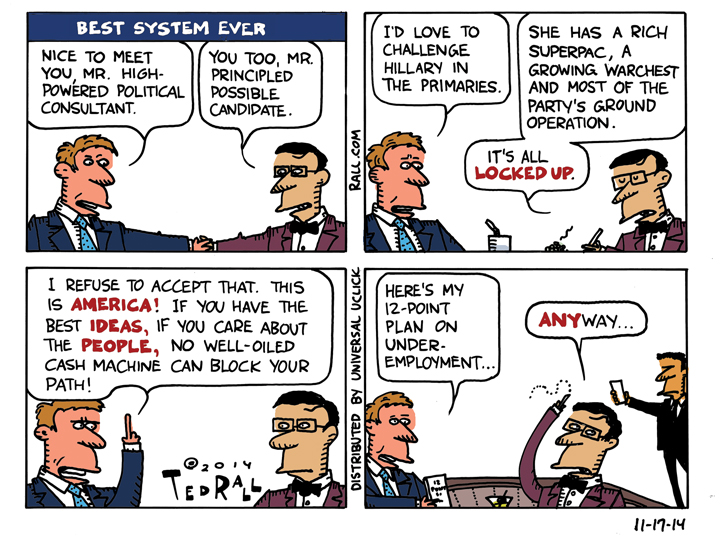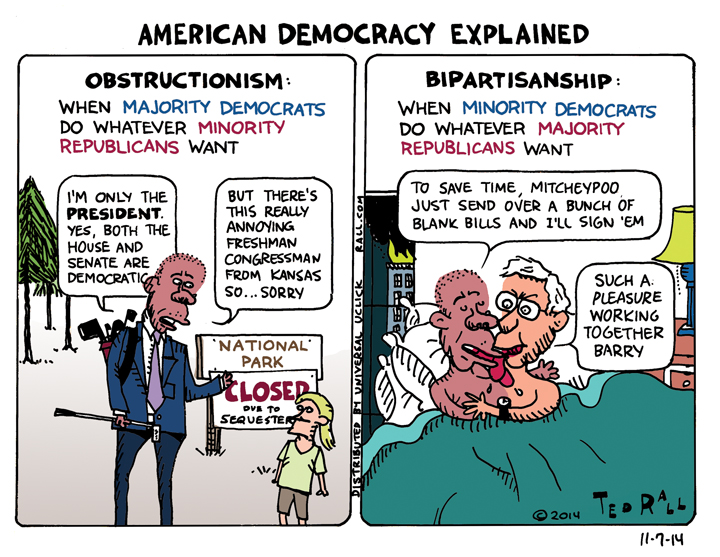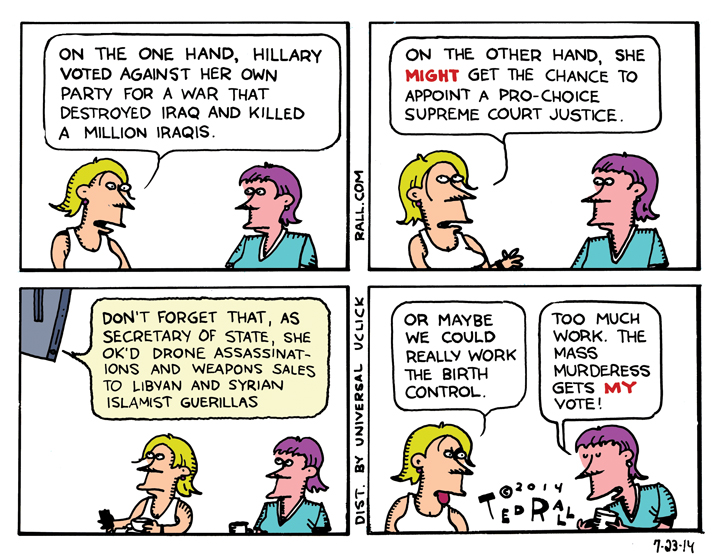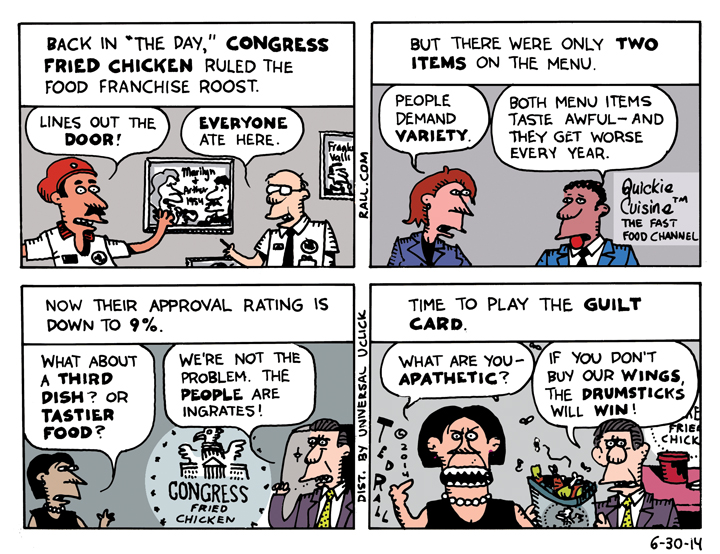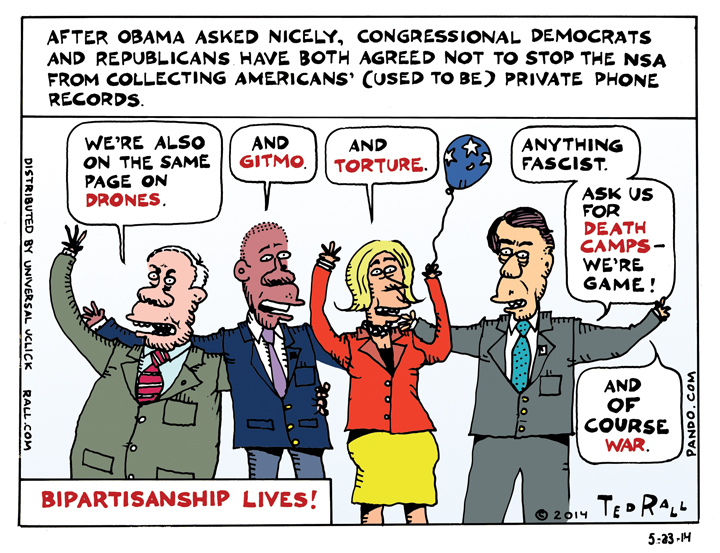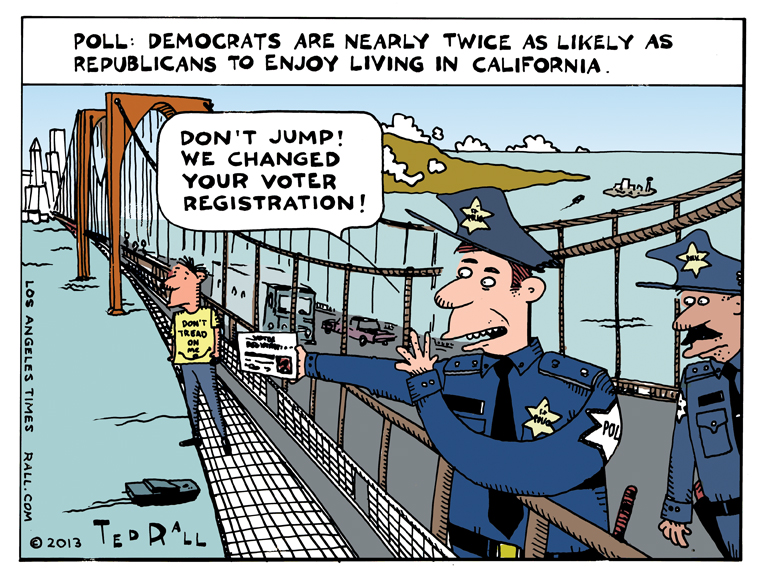Right-wing groups are feeding material attacking Hillary Clinton from the left in the hope that it will weaken her support among progressives. What are liberals supposed to do, ignore her perfidy because they’re learning about it from conservatives?
The High Price of Abortion Rights
Hillary Clinton supporters are resurrecting an argument made by Obamabots to progressives: Despite her support for right-wing policies like NAFTA and voting for war against Iraq, liberals should vote for her because she might get to fill a vacancy on the Supreme Court that might determine whether abortion remains legal. I’m pro-choice, but I’m nauseated by the thought that the right to an abortion necessitates voting for someone like Hillary Clinton, who has the blood of millions of innocent people on her hands.
SYNDICATED COLUMN: At Some Point, Progressives Need to Grow a Pair and Stop Having Anything To Do With the Democratic Party

At a certain point, if you have any relationship with dignity, you’re supposed to get sick of being used and abused. Speaking of which: liberal Democrats.
Democratic politicians act like right-wingers. Liberals vote for them anyway.
The Democratic Party espouses right-wing policies. Self-described progressives give them cash.
Comedian Bill Maher gave them a million cash dollars — yet Democrats don’t agree with him on anything. Why? Because he hates Republicans even more.
Why didn’t Maher save his money? Or better yet, fund a group or a writer or an artist who promotes ideas he actually agrees with? Because he, like tens of millions of other liberals, are stuck in the two-party trap.
The relationship between liberals and Democrats is dysfunctional and enabling, abused pathetics sucking up to cruel abusers. Progressives like Maher are like a kid with two rotten parents. The dad drinks and hits him; the mom drinks less and hits him less. The best call is to run away from home — instead, most children in that situation will draw closer to their mothers.
Voting-age progressives, on the other hand, are adults. When will they kick the Democratic Party to the curb, as Ricki Lake used to say?
Probably not in time for 2016. But they ought to.
You don’t have to be clairvoyant to see that the next presidential election promises nothing for liberals but more of the same: dismay, disappointment and disgust — in no small part with themselves.
Hillary Clinton, a conservative warmonger ideologically indistinguishable from Dwight Eisenhower, will almost certainly be the Democratic nominee. But she isn’t really a Democrat. Traditionally, Democrats were pro-worker; she and her husband pushed through NAFTA, GATT, the WTO and a slew of free-trade scams that have destroyed American jobs and depressed salaries. Democrats cared about the poor; Hillary has never so much as suggested a substantial anti-poverty initiative. Democrats aren’t supposed to invade sovereign countries for the hell of it; Clinton repeatedly pushed WMD lies, voted to invade Iraq and still hasn’t apologized for the two million Iraqis whose deaths for which she shares responsity. Democrats want single-payer healthcare; instead, she created the template for Obamacare, which keeps rates high to protect insurance company profits.
Yet in today’s “Democratic” Party, Hillary is “inevitable.”
Yes, the highly resuméed, slightly accomplished ex-senator could face a challenge from the left. But not a real one. Even if party bosses allow an actual primary process (they did not in 2012), any primary challenge will be symbolic and impotent (hello Bernie Sanders), poorly funded and sad, raising the faded, tattered flag of liberalism in a quixotic bid to coat Hill’s coronation with a veneer of small-d democratic legitimacy.
If you’re a leftie, the Democratic establishment doesn’t care about your opinion. They certainly don’t want your input. What they want is your vote — in exchange for exactly nothing in return. They’re political parasites, draining the enthusiasm and idealism of progressives, simultaneously neutering and exploiting mainline libs.
Like a tick, mainline “centrist” (i.e. conservative) Democrats will suck you dry. First they misdirect your hope for real change. Then they extract your vote. By the time you realize you’ve been chomped, the buggers drop off, bloated on stolen power and wealth.
You’re left with drained political energy.
During the initial months following the election, you get angrier. You watch con artists like Obama take office, appoint right-wingers to the cabinet and ignore America’s victims — the poor at home, the bombed overseas. Off goes the president — your president, since you voted for him! — golfing and shooting hoops and vacaying on the Vineyard while millions lose their homes to illegal foreclosures, poverty soars, the military gins up new wars and expands old ones, Gitmo stays open and killer drone planes fill the skies. Eventually, of course, you get over it. You recover.
Then, two to four years later, the parasitical Dems are back to suck out whatever idealism you’ve managed to regenerate.
Progressive Democratic voters are understandably unenthusiastic about Hillary Clinton. After enduring her conservative Southern Democratic husband (major accomplishments: bombing Bosnia, ignoring Rwanda, NAFTA, trashing welfare) and Obama (major accomplishments: drones, Libya, Syria, Iraq again), they know what’s coming: more of the same. Because they’re not willing to ditch the Democratic Party, however, they’re trapped in a state of cognitive dissonance, unable to act in order to avoid certain disaster.
Thus progressives are resorting to ridiculously transparent non-tactics. For example: “deploy[ing] the spectral presence of [Elizabeth] Warren to extract as many [liberal] concessions as possible.”
“It’s not a crazy strategy,” libbies are told. “The mere thought of Warren seems to rattle the Clintons, who are haunted by the debacle of 2008.” Actually, it is crazy. Because the Clintons watch the news — and Warren ain’t running.
Noam Scheiber recently wrote a New Republic piece titled “How Hillary Won Over the Skeptical Left,” in which he argues…well, read the title. (Note: by “left,” Scheiber doesn’t mean left. He means centrist Obama supporters, who are slightly to the left of Hill.)
“It’s not that liberals don’t perceive some ideological distance between themselves and Hillary Clinton, at least as they become more informed,” writes Scheiber. Hillary became First Lady in 1993. What is there left to learn? “Nor is it that they recognize this gap and simply don’t care about it. It’s that, after the somewhat disillusioning experience of the Obama years, many actually consider this gap an advantage for Clinton.” In other words: we’re out to beat Republicans, not help poor people.
I’m quoting the following section from Scheiber’s piece at length because it supports my contention that, at this early stage, it is perfectly obvious that Hillary Clinton will screw over progressives. Not only is it evident that she will break their hearts, it is clear how she will go about it.
So let’s say Democrats’ faith in Clinton is rewarded and she wins the presidency. Here is how the 2016 transition is likely to play out. Having talked about inequality during the primaries, and maybe even the general election, she will feel pressure to appoint economists who know something about the issue. She will pluck a few advisers from the reserve army of liberals at think tanks like the Center for American Progress (home to many former Clinton White House aides over the years), the Economic Policy Institute, and the Center on Budget and Policy Priorities.
But as the transition goes on, liberals will notice a disconcerting shift. They will watch most of the senior posts in her Treasury Department go to alumni of Wall Street. They will see her fill out the top echelons of financial regulators—the Securities and Exchange Commission, the Commodity Futures Trading Commission, the Office of the Comptroller of the Currency—with banking-industry lawyers. They will even notice bankers turning up in agencies with little role in finance, like the State Department and the U.S. Trade Representative. Though any one appointment may be justified—the Treasury undersecretary for domestic finance should probably have a finance background, for example—the larger mass of Wall Street transplants will create a stubborn level of groupthink. Their skepticism toward policies like a financial transactions tax, aggressive prosecution of financial-market crime, and breaking up the megabanks will ensure they never happen.
Don’t come back in 2017 and say you were surprised.
(Ted Rall, syndicated writer and cartoonist, is the author of “After We Kill You, We Will Welcome You Back As Honored Guests: Unembedded in Afghanistan,” out Sept. 2. Subscribe to Ted Rall at Beacon.)
COPYRIGHT 2014 TED RALL, DISTRIBUTED BY CREATORS.COM
LOS ANGELES TIMES CARTOON: Dems Luv Cali
I draw cartoons for The Los Angeles Times about issues related to California and the Southland (metro Los Angeles).
This week:
According to a new poll, “Californians’ perceptions about living in the Golden State are fractured along political, geographic and generational boundaries.”
Is California one of the best places to live? 53% of Democrats say yes. Only 26% of Republicans do.
Even if you’re liberal, the knowledge that conservatives are bummed out about living in the same state that you consider paradise has to give you pause. After all, you’re liberal. You’re supposed to care about other people — especially other people who tell you that they don’t care about you.
Also, you might ask yourself: what if I’m wrong and they’re right? What if California really is hell on earth? Does that make me…crazy?
What I want to know, and the poll does not and cannot reveal, is why members of the two major parties view the state’s quality of life so differently. Is it political — are Republifornians chafing under Governor Jerry and a Sacramento dominated by his Dems? Or does it reflect different worldviews? When Republicans look at the sky, do they see a different hue? When they hear the words “Miley Cyrus,” do their hearts quiver at an alternate frequency?
What about third parties? How do Greens and Libertarians enjoy/hate living here?
Anyway, this cartoon falls into the “illustrative” category of the political toon genre — a piece that doesn’t take an editorial stance, but rather shows what’s going on for its own sake. I have often been critical of this type of cartooning, but I make exceptions (hey, to be human is to be a hypocrite) for cartoons that highlight minor blink-and-you’ll-miss-it stories that have, or may have, broad implications.
Which this one is.
Now that you know that right-wingers dislike living in California, maybe you should consider being nicer to the dude in the monster truck-sized SUV who cuts you off if it has a Tea Party bumper sticker. Chances are, he’s depressed enough us as it is without you honking at him.
Also, he’s more likely to be armed.
SYNDICATED COLUMN: Smart Young People Who Snub Politics Are Smart

Smart Young People Reject Public Service — Because They’re Smart.
America’s best and brightest don’t go into politics.
(By which we mean mainstream two-party corporate politics. Democrats, Republicans, Washington. Politics as activism, as the ongoing debate over how we should live our lives, remains of great interest to young people.)
Mediocrity among the members of the political class is often cited as a reason for government’s ineptitude, its inability/unwillingness to address the great problems we face today: climate change, soaring income inequality, the Third Worldification of America. If we had smarter, more charismatic politicians, the reasoning goes, we’d get smarter, more effective problem-solving.
Forget it. The word from the trenches of academia is that that’s not going to change. Millennials just aren’t interested.
A national survey of 4200 high school and college students conducted last year found that only 11% might consider running for political office. Most young people say they want nothing to do with a career in government.
We don’t know how that number compares to the past. As Fareed Zakaria points out, “Americans have always been suspicious of government. Talented young people don’t dream of becoming great bureaucrats.”
Still, like other mainstream media types, Zakaria thinks disinterest in public service has increased. “The New Deal and World War II might have changed that for a while, but over the past 30 years, anti-government attitudes have risen substantially,” he says.
Young people think politicians can’t/don’t make much of a positive impact in people’s lives. In a poll of 18- to 29-year-olds, Harvard’s Institute of Politics found a 5% increase, to a third, in the portion of young adults who believe that “political involvement rarely has any tangible results.” When asked about the statement “politics today are no longer able to meet the challenges our country is facing,” 47% agree and 16% disagree.
I was thinking about this a few weeks ago while researching a column about the possible presidential candidacy of Hillary Rodham Clinton in 2016. First lady, senator, secretary of state — Clinton is one of the most successful political figures of our time. Yet what has she actually accomplished? How has she changed the life of the average American? Where is the big feather in her foreign policy cap? She’s been busy, but she hasn’t done anything historical — and the same could be said of almost all her peers.
Future coulda-been bests and brightests are paying attention to Washingtonian disfunction. “How deep is the disengagement?” Ron Fournier asked in The Atlantic. “I spent two days at Harvard, and couldn’t find a single student whose career goal is Washington or elective office. One wouldn’t expect to hear this at the Kennedy School of Government.“
Which prompts two questions:
Why are the young eschewing politics?
Can we do anything to make a career in politics/government more appealing?
Zakaria offers a “why”: “The ever-increasing obstacles — disclosure forms, conflict-of-interest concerns, political vetting — dissuade and knock out good candidates.”
I disagree. Getting exposed for financial or other improprieties is a concern for some political prospects in their 50s or 60s. But the most that your average 21-year-old college senior has to worry about getting outted over is drug use, and if current trends continue, no one is going to care about that in a few years. After all, George W. Bush and President Obama both used cocaine.
Not long ago I was approached by an Important Democratic Party Official about running for Congress. After he saw a talk I gave to a group of high school students, he pronounced himself so impressed that wouldn’t stop calling me. The party needs you, he said. So does your country.
Heady words. And I’m at least as egotistical as the next bear. So I looked into it.
I wasn’t concerned about personal disclosures. I’d be running as far to the left as you can in today’s Democratic Party; my district is very liberal on social issues. Whatever came out wasn’t bound to hurt my prospects. Anyway, I have a theory about political strategy: your opponents can’t use your deeds against you. They can exploit your denial of those deeds. Candidates who reveal their own skeletons find the electorate much more forgiving than when they’re uncovered by their opponent’s “opposition research” team.
Money would have been a major issue. You need at least $1 million to fund a Congressional campaign. It’s easiest if you have it yourself, and if you have rich friends willing to bankroll you. I don’t.
This is a grim system we have. “Wealthy candidates who try to buy office with their own money tend to lose, but in order to set up a campaign, you have to know a lot of wealthy people and wealthy special interests — and that’s something that most of us are not privy to,” Craig Holman, government affairs lobbyist for Public Citizen, told CBS News.
I might have been able to sell out to local business interests in exchange for favor chits to be cashed in later. But then, why run in the first place? For me, the point of running for Congress is to have a chance to change things for the better.
Washington has plenty of you-scratch-my-back-I’ll-scratch-yours corruption as it is. (I’m talking to you, Former Treasury Secretary/Warburg Pincus President Timothy Geithner.) They don’t need more from me.
The money thing is pretty much insurmountable.
Even presupposing a dramatic upturn in my finances (Powerball win? Selling a kidney to a desperate Internet billionaire? Kickstarter?), there’s the question of what I could accomplish in Congress. This is assuming, of course, that I win. Half of candidates lose, with nothing to show for their million-plus bucks.
Like the kids at Harvard, I can’t think of a single Congressman or, for that matter, Senator, who has managed to achieve much for the working class, or the environment, or anything big, since, well — my entire life. And I’m 50. As a political junkie, I would have heard of something.
Senator Ted Kennedy was one of my political heroes. I worked for two of his presidential campaigns. But let’s be honest. What was his greatest political accomplishment? Probably the State Children’s Health Insurance Program. A nice piece of law to be sure, but a small-bore one — and hardly worth spending decades of your life sitting through endless boring meetings.
And that’s what you do in Congress. You sit on your ass waiting for a chance to talk to people who are waiting for you to shut up so they can talk.
To an empty chamber.
Perhaps I should amend this: politics makes sense for right-wingers.
Republicans have radically transformed American society in recent years: legalized torture, extraordinary rendition, Guantánamo concentration camp, preemptive warfare, the doctrine of the unitary executive, sweeping tax cuts for the ultrarich and yes, even Obamacare — that one was dreamed up by the right-wing Heritage Foundation.
Liberals and progressives, on the other hand…there’s not much for us in the world of mainstream politics.
If we want leftie — most young people are — bright young things to enter public service, public service is going to have to change first. Obviously, that doesn’t seem likely. So if you’re a smart, energetic young person who wants to change the world, there’s still a place to do that.
Not in Congress.
In the streets.
(Ted Rall’s website is rall.com. Go there to join the Ted Rall Subscription Service and receive all of Ted’s cartoons and columns by email.)
COPYRIGHT 2013 TED RALL

